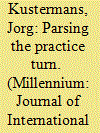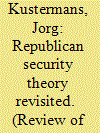|
|
|
Sort Order |
|
|
|
Items / Page
|
|
|
|
|
|
|
| Srl | Item |
| 1 |
ID:
183779


|
|
|
|
|
| Summary/Abstract |
There is increasing agreement that states and other political actors on the world stage sometimes achieve international authority. However, there is less agreement about the nature and functioning of international authority relations. What determines whether an actor will be recognized as an authoritative actor? And what are the effects thereof? In this essay, we identify four distinct conceptions of authority in the study of international relations: authority as contract, authority as domination, authority as impression, and authority as consecration. Consideration of the typology leads to two important insights. First, the phenomenon of authority has an essentially experiential dimension. Subordinate actors’ emotional experience of authority determines their response to authority and thus also has a fundamental impact on the stability of authority. Second, the emergence of forms of international authority does not entail, at least not necessarily, the weakening of the sovereignty of states, but can equally be argued to strengthen it.
|
|
|
|
|
|
|
|
|
|
|
|
|
|
|
|
| 2 |
ID:
168167


|
|
|
|
|
| Summary/Abstract |
This article discusses the diplomatic practice of gift-giving in the Ancient Near East and Early Modern East Asia. In both cases, gift-exchange served to consolidate the dominant polity’s international authority. The causal relation between gift-giving and authority is typically rendered in terms of generosity inspiring gratitude, but a different mechanism connects diplomatic gift-giving and the consolidation of international authority. Diplomatic gift-giving is a ceremonial form of gift-exchange and it as a ritual practice helps maintain international authority. By means of ritualization, diplomatic gift-exchange renders international authority palatable. Ritualization enables both dominant and subordinate actors to come to terms with the ambiguity of the experience of authority. Subordinate actors are at once entranced and frightened by the authority of the dominant actor. The dominant actor feels both pride and insecurity. By defining an identity as participants in a shared ritual, by orchestrating their demeanor during ritual, and by identifying an external source of the dominant actor’s authority, diplomatic gift-giving contributes to the maintenance of international authority. The ambiguity of the experience of authority is probably irreducible. It is therefore to be expected that any case of ‘international authority’ will feature the performance of similar ritualizing practices.
|
|
|
|
|
|
|
|
|
|
|
|
|
|
|
|
| 3 |
ID:
114987


|
|
|
|
|
| Publication |
2011.
|
| Summary/Abstract |
The quest for perpetual peace is a modern phenomenon, associated with a progressive view of history which emerged only in the Enlightenment. In addition, boredom - a feeling of ennui associated with a loss of the ability to act - is a fundamental mood of the modern age. Modern societies are thus, simultaneously, becoming more peaceful and their inhabitants are becoming more bored. As a means of overcoming our boredom, we are increasingly fascinated by violence, and war is glorified as a means of restoring our ability to act. Empirical illustrations of this thesis are drawn from World War I and from the Bush administration's 'global War on Terror'.
|
|
|
|
|
|
|
|
|
|
|
|
|
|
|
|
| 4 |
ID:
144063


|
|
|
|
|
| Summary/Abstract |
A substantial body of literature centers on the concept of ‘practice’. This article parses the practice turn in International Relations. It suggests that the meaning of ‘practice’ is a moving target. Sometimes it means process. Sometimes it refers to a particular type of knowledge and related action. And sometimes it is used as a quasi-synonym for institution. There are actually three concepts animating the practice turn: ‘practice’, ‘practical knowledge’, and ‘practices’. These concepts hail from different intellectual pastures and lead to different ways of explaining and understanding international relations. The article introduces the three concepts, explains how each concept entails a particular interpretation of the nature and possibility of change, as well as affords a particular theory of peace(making).
|
|
|
|
|
|
|
|
|
|
|
|
|
|
|
|
| 5 |
ID:
108499


|
|
|
|
|
| Publication |
2011.
|
| Summary/Abstract |
Republicanism is getting increasing attention in International Relations. Engaging Daniel Deudney's Republican Security Theory, it is argued that republicanism should be interpreted in ideological terms, that it is a polysemous tradition of political thought, and that it matters because it is socially embodied in world political practice. Special attention is given to republicanism's relationship to the question of technology. A short case study of the Cold War illustrates the central claims of the argument.
|
|
|
|
|
|
|
|
|
|
|
|
|
|
|
|
| 6 |
ID:
183905


|
|
|
|
|
| Summary/Abstract |
The contributions to this Forum on Ritual and Authority in World Politics examine the role that ritual performances play in the constitution of positions of authority and the maintenance of relations of authority in historical and contemporary international relations. The Forum takes as its point of departure three related observations: (i) that recent years have witnessed a remarkable upsurge of interest in ritual as a recurring feature of international practice, but (ii) that this recent interest in ritual has not extended, thus far, to the study of international authority, (iii) in spite of political anthropologists’ long-standing claim that the performance of ritual is absolutely crucial to the production of authority. The performance of ritual grounds, makes tangible and enhances various forms of authority, including forms of international authority, historical and contemporary. The contributions to this Forum demonstrate the veracity of that claim in five different empirical contexts—Byzantine diplomacy, early modern cross-cultural encounters, British imperialism in India, military lawyering in America’s armed forces, and the casting of ballots in Crimea and the US—and attempt also to explain precisely how it is that ritual served to undergird and stabilise authority in these various instances.
|
|
|
|
|
|
|
|
|
|
|
|
|
|
|
|
|
|
|
|
|